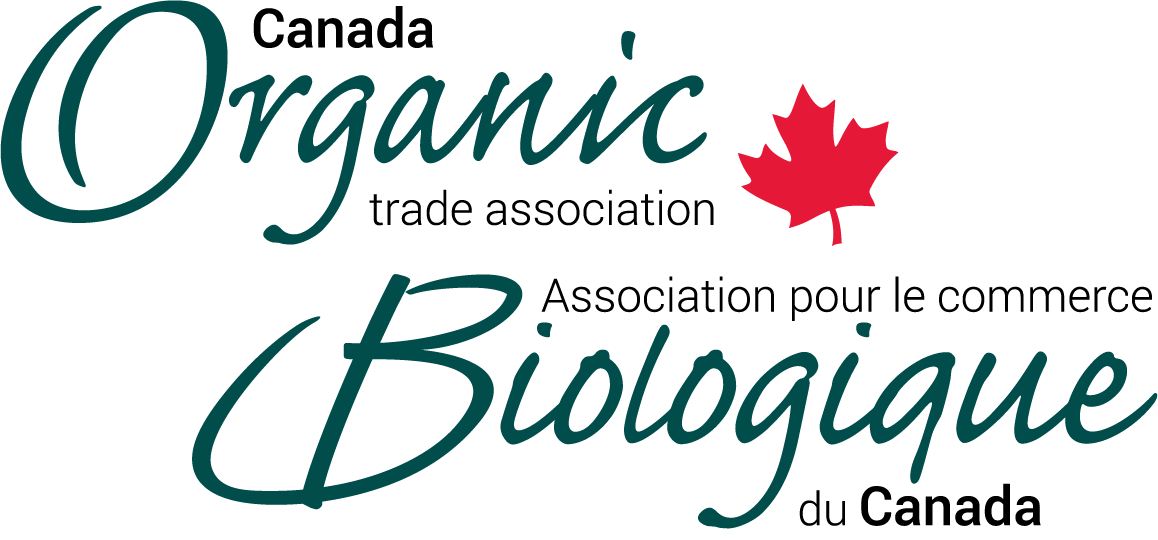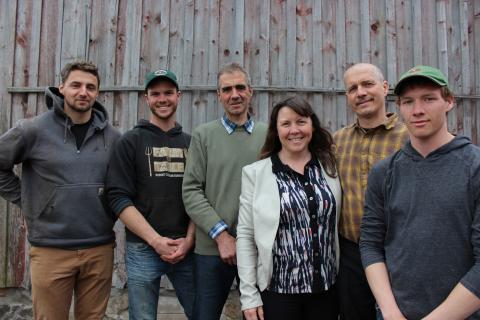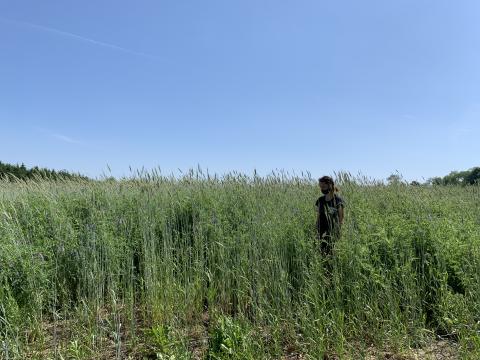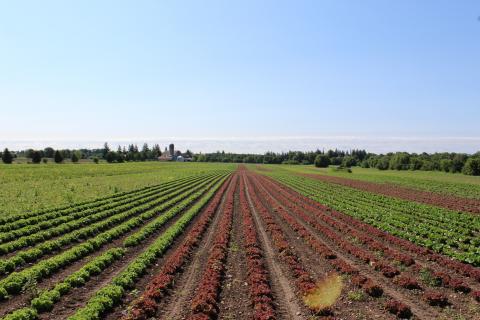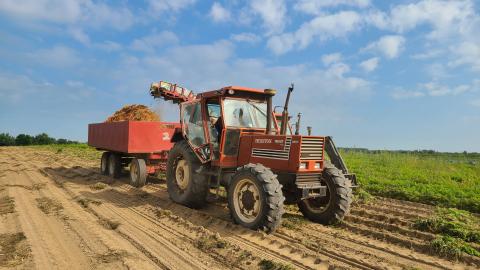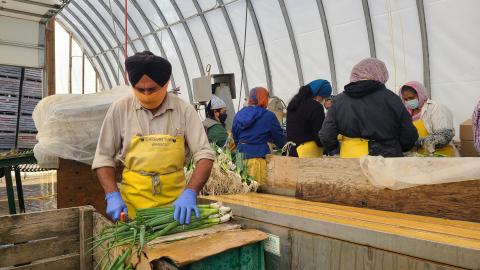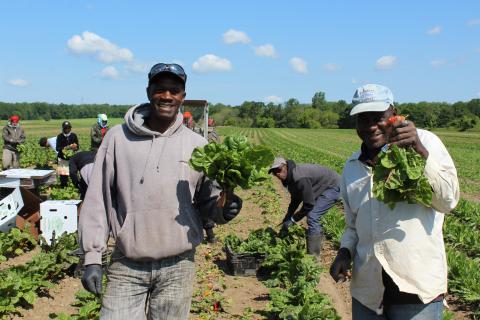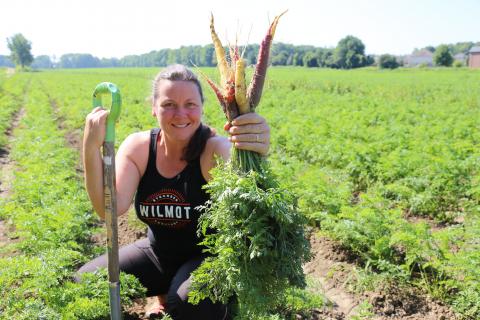Tell us about your organization and the people who work there.
We grow a variety of vegetables on close to 700 acres in New Hamburg, Ontario. We also pack and distribute produce from other local growers throughout Southern Ontario and run an import program to fill in the gaps when something is out of season or doesn’t grow here at all. This keeps our selection of certified organic produce complete.
Our customers are grocery stores, health food stores, food box companies, restaurants and other types of processors. We have a core group of about 30 local employees, and that number increases to over 100 in our growing and harvesting season. Locals, students, and migrant workers from Jamaica make up our Pfamily!
What are you trying to achieve through your vision, mission, and purpose?
Our purpose is to feed people while protecting the environment and building our soil so that it can sustainably feed not only our generation, but many generations to come. We want people and communities to thrive, so we try to ensure that we are doing what we do in a way that creates community, while feeding community.
How was the organization founded? What are the origins of the organization?
Farming was the way of life for the Pfenning family as far back as family history shows. Wilhelm Pfenning, co-founder of the farm business as it is today, began his journey into organic agriculture back in Germany. Along with others of his generation, initially he embraced the short-term yields and other advantages that came with the addition of chemicals to farming. However, he observed a decline in his own health and began to question whether these advantages were worth it or even sustainable in the long term.
After many years of research, learning, and experimentation he made the decision to rely solely on organic methods and never looked back. In 1981 he, along with his wife Barnhild and their four children, made the decision to move to Canada. They settled where we are today in New Hamburg, and the two of them founded the farm business. Currently the farm is run by their sons Wolfgang and Ekk, along with their spouses Regina and Jenn respectively. The next generation is bringing their own unique skills and perspectives as some of them have taken on roles on the farm. Many things have changed on the farm and in the marketplace, but our core values remain the same!
Why did your organization become a member and why do you stay a member of the Canada Organic Trade Association?
As an organic farm, we have always been politically engaged. We helped found the first certificate and set the first regulations in Canada and North America and have actively lobbied to support and develop the organic industry, and have the government recognize the standard for organic. We recognize that government policies and processes impact how we work and do business with our neighbours and outside of our borders.
An organization like COTA is vital to ensure that we as a sector can speak to government about things that matter to us. COTA has a vital role in reciprocal trade agreements, international equivalencies, maintaining the standard, and more. Before there was an organic standard, one issue we faced was being outcompeted in our own market by products grown outside of our borders under different certification requirements. It wasn’t a level playing field.
One of the key reasons we need to have a strong voice as a sector, as an organization for the organic industry to speak to government is that when those standards came in, we were able to provide feedback to government as to what should be accepted as par, and what should not be accepted at all. For example, sodium nitrate: it makes a significant difference in the appearance of vegetables. The USDA standard allows it, but the Canadian standard does not. Being able to communicate with the government about things like that is important as standards evolve globally. COTA has done much to elevate organics in Canada and on the global stage. This is why we are proud to continue to be members!
Please share highlights of your organization’s innovation, inspiration, and dedication to organic.
Farmers face many challenges, and in some seasons, they may seem insurmountable. However, farmers are also known to be a resilient bunch and we always seem to find a way through. Some of the challenges we have dealt with in recent years include increasingly unpredictable weather, price fluctuations, volatile fuel prices, and the steadily increasing cost of labour. With each of these factors we need to focus on mitigating the impacts, such as drainage and irrigation systems to handle inconsistent rain, or storage solutions to weather price drops during peak harvest season. One of the most prominent challenges we face in organic vegetable production is weeds, and the associated labour costs. There have been many attempts by equipment manufacturers and growers alike to find solutions. We have embraced everything from allelopathic cover crops to a Weed Zapper, and we are constantly experimenting with seed bed preparation methods and cover crops.
Not everything works in every climate or on every farm, but we are always willing to try something new. Managing weeds on an organic farm is a never-ending challenge but growing organic vegetables is what we are passionate about, and we consider any of these challenges as an opportunity to do something great.
How does your organization interact with organic?
We have been a certified organic farm since the inception of organic certification in Canada. Certification is a concept we believe in so strongly we require it from all our suppliers. The fundamental concept of organic informs not only our growing practices but our business practices as well.
What advice do you have for newbies in the industry?
You will never be at a point in your journey when you have arrived. Continuous improvement is the key. Some things will get easier with time, but if you stop learning and growing and pushing the industry to be better, regulations to be better, understanding of the environment to be better, then we will not achieve all that organic can be. Never stop asking questions! Of yourself and everyone around you.
What gets you most excited about the organic community and your involvement in it?
Community. Commitment. A sense of purpose and value-driven organizations. Being a part of something that has the capacity to radically transform how we grow food. It has already begun to transform it! Being part of organic farming is being part of a business/farming model that not only looks at what we’re doing right now, but how it will impact the future. A lot of industries don’t consider the outcome 50/100 years from now, but ours actively and intentionally considers it, and looks to improve outcomes.
What are your hopes and dreams for transforming the food system to be more ecological?
I would like to see a broad adoption of smaller – instead of bigger and bigger as we have been seeing in our lifetime and taught that is progress.
If we’re truly looking to feed more people, I believe smaller is more necessary. There are ways that smaller can produce more per acre than large scale. Economies of scale happen when you size up, but you also lose certain efficiencies.
I would like us to work towards eliminating redundant trade. The same product should not be going down the road in both directions. It sounds complicated but at its core it’s not.
For organic farming to be more ecological, it needs to be more financially sustainable. We need to figure this out.
About:
Jennifer Pfenning is a family owner and the Director of Human Resources, Marketing and Operations at Pfenning's Organic Farm in New Hamburg, Ontario. She enjoys working alongside local and migrant workers to produce food that serves her passion for healthy living, food justice and strong community.
Jenn is an active participant in boards and committees. She is the past President of the National Farmers’ Union Local 340 - Waterloo Wellington and served on the Foodshare Toronto Board of Directors for seven years. She also served on the Waterloo Region Food System Roundtable and is the past president of the Organic Council of Ontario. Presently, Jenn is the Canadian representative on the Migration Collective of the international peasant movement, La Via Campesina, and Chair of the NFU Migrant Worker Solidarity Working Group.
To learn more about Pfenning's Organic Vegetables visit https://pfenningsfarms.ca/
